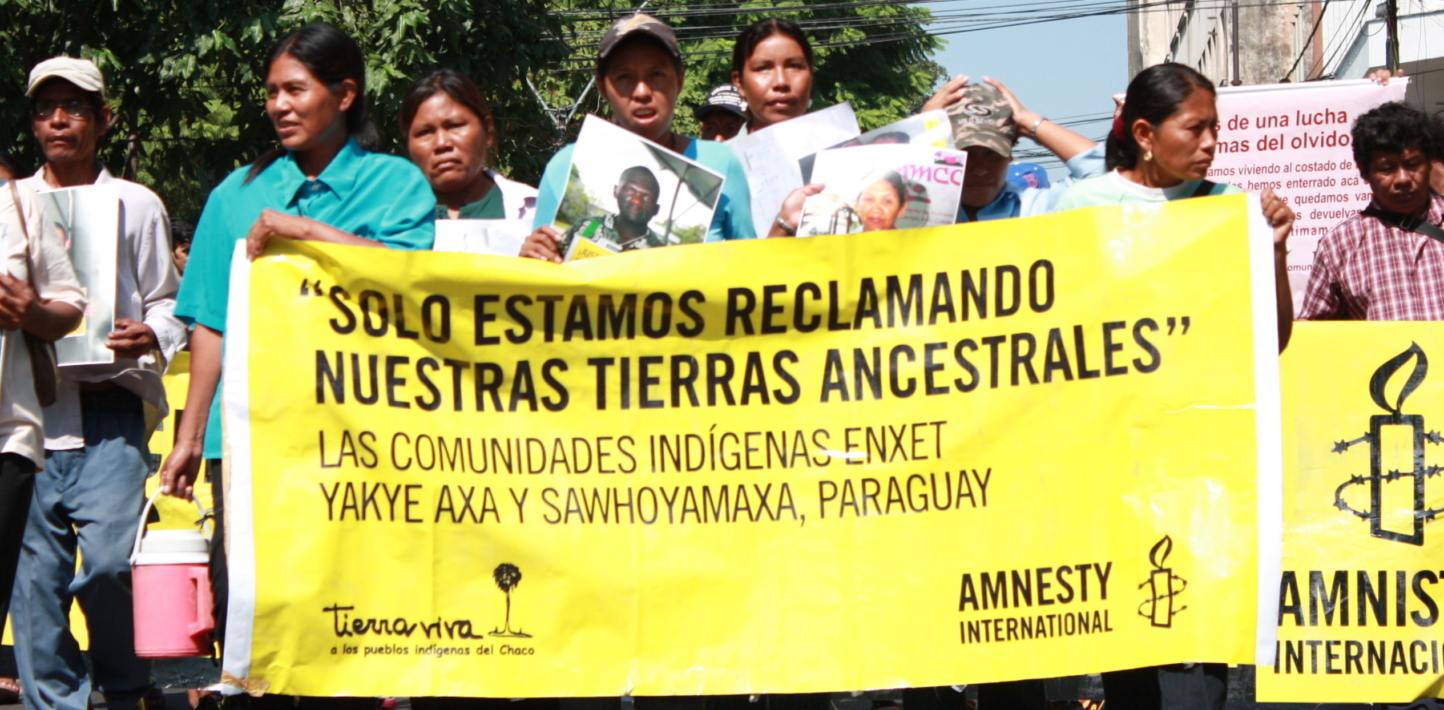When Carlos Mareco, a leader of the Sawhoyamaxa indigenous community, heard the news that after a two decade long painful legal battle, his people will be able to return to their ancestral lands, he couldn’t help but shed a tear.
“We Indigenous People cry only when we have achieved our freedom. Today, it is like we are coming out of a prison, so many of us are crying because it is so emotional,” he said.
For years Carlos Mareco and his community lived on a precariously narrow stretch of land by a major highway.
Yesterday, Paraguay’s President, Horacio Cartes enacted a law approving the expropriation of more than 14,400 hectares of land in the Chaco region, returning the land to the Sawhoyamaxa. With the stroke of a pen, the Paraguayan State began undoing some of the wrongs suffered by the community for generations.
I will never forget the first time I went to visit the community.
It was 2012 when I arrived. Missing the ramshackle dwellings would have been easy if I hadn’t been with some of our colleagues from Tierraviva, the Paraguayan NGO that has accompanied the Sawhoyamaxa during their struggle for the land. They knew exactly where to stop.
We were meeting some of the 160 families that make up the community. They lived in a narrow stretch of land by the Concepcion-Pozo Colorado highway. The only thing separating the community from the lands their ancestors had inhabited for generations was a fence built by the man who claimed ownership to the plot.
The scene was shocking – but their courage, inspirational.
Men and women, young and old, were fighting to survive with barely anything. Food and water were scarce. They lived in temperatures that reached as high as 40 degrees Celsius. Everybody was terrified of the enormous trucks that raced by the fragile wooden houses they lived in.
The people I spoke to, who are so often treated as second-class citizens, would never have believed that the Paraguayan Congress would debate the needs of Indigenous Peoples, let alone that the President would one day find in their favour.
But then this week the impossible happened- the President signed a law that would allow the Sawhoyama to return to their ancestral lands.
“We lived at the side of the road, we lived terribly. Various people in the community died in accidents or through illnesses. Nobody respected us. Now, we are triumphant. I am very happy but I’m crying because my grandmother, my father and many of my family did not have the chance that I have today to enjoy our land. I’m grateful to everyone!” said Aparicia González, a member of the Sawhoyamaxa community.
The road to victory was a long one. The legal battle of the Sawhoyamaxa began in 1991 when the community took legal action for recognition of their rights to the more than 14,000 hectares of ancestral lands in two areas now known as Retiro Santa Elisa and Estancia Michi in the north of Paraguay.
Fifteen years later and having received no positive responses from the authorities they took their claim to the Inter American Commission of Human Rights and the Inter American Court of Human Rights, which ruled in their favour in 2006.
Since 2009 Amnesty International’s members in Paraguay and across the world have been putting pressure on authorities to resolve the situation and ensure the Sawhoyamaxa could return home.
Land is essential to all indigenous communities. Without it, their way of life and very survival is at risk. Without land they cannot grow food, hunt and perform their cultural traditions. Without land, they can barely survive, let alone prosper.
This news is nothing short of incredible, and not only for the Sawhoyamaxa.
According to official figures, there are around 108,600 Indigenous People in Paraguay – 1.7 per cent of the population – although this is likely to be a significant underestimate of the true figure.
Most of them are invisible – discriminated against and forced to live in extremely poor conditions. Levels of poverty and illiteracy are significantly higher among Indigenous Peoples compared to the rest of the Paraguayan population.
There are others still fighting. The indigenous community of Yakye Axa, is also waiting to return home, after the Inter American Court of Human Rights also ruled on their favour in 2005 and an agreement with the landowner of their land was reached in 2012. They are still waiting for the access to that land to be cleared.
Now the Sawhoyamaxa are celebrating a historic victory. We can only wait to see how much longer the many others fighting for their rights to their land will have to wait.
More InformationParaguay: Celebrations as law will return ancestral land to indigenous community after two decades of destitution (News Story, 11 jkune 2014)
Trucks, lack of water and little food: Indigenous community struggles to survive by the side of a road in Paraguay (Feature, 17 December 2012)


